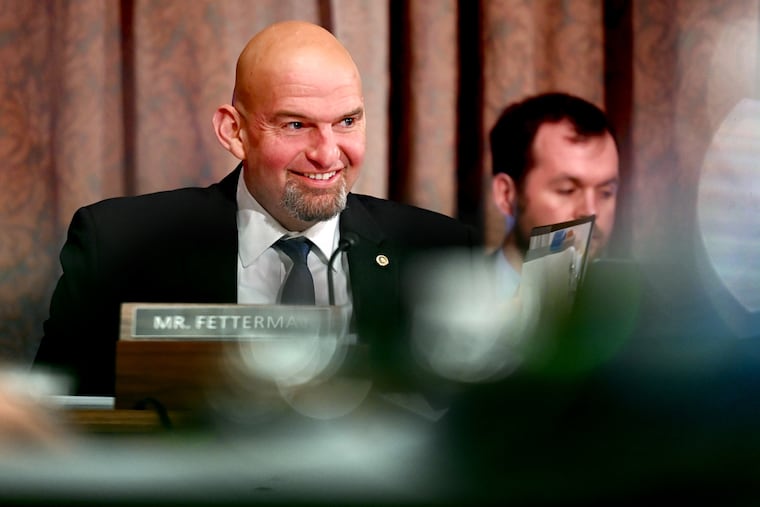Fetterman proposes bill granting SNAP benefits to striking workers
Currently, households where a striking worker lives cannot access SNAP benefits unless they were already eligible before the strike.

A bill introduced by federal lawmakers on Thursday would give striking workers the ability to receive food stamps during their work stoppages.
Since the 1980s, Supplemental Nutrition Assistance Program (SNAP) benefits have not been available to striking workers, unless they already had qualified for SNAP before the work stoppage.
The new legislation, introduced in both chambers by Pennsylvania Sen. John Fetterman and Reps. Alma Adams (D., N.C.) and Greg Casar (D., Texas), would remove that restriction. SNAP recipients would still have to meet income eligibility and other requirements to get the benefits.
While some unions provide members with monetary assistance during a work stoppage, through a strike fund that draws on membership dues, those amounts are often less than the workers’ usual pay rate. Workers without a union are able to strike under U.S. labor law, but wouldn’t have access to union funds.
Fetterman’s office, announcing the bill, made note of ongoing work stoppages in Pennsylvania, including a strike of more than a month at Wabtec Corp. in Erie, by members of the United Electrical, Radio, and Machine Workers of America, and a strike at the Pittsburgh Post-Gazette, where employees stopped work in October. He also noted national strikes by TV and film writers and actors, which include Pennsylvania members of SAG-AFTRA and the Writers Guild of America.
The Philadelphia region has seen several other high-profile strikes in recent months, including Temple University graduate student workers, Philadelphia Museum of Art staff, Rutgers University faculty, and Teamsters at the Liberty Coca-Cola distribution center.
Also locally, Starbucks workers have engaged in short-term work stoppages, including a one-day strike last week affecting five Philadelphia stores. UPS recently averted a threatened strike by reaching a contract with the International Brotherhood of Teamsters, which represents about 340,000 UPS workers across the country, including thousands in the Philadelphia region.
“Every union worker who is walking the picket line this summer needs to know that we have their back here in Washington,” Fetterman said in a statement Thursday. “It is critical for us to protect workers’ right to organize, and that includes making sure they and their families have the resources to support themselves while on strike.”
The bill’s 13 Senate cosponsors, all Democrats, include Pennsylvania Sen. Bob Casey, Sen. Cory Booker (D., N.J.) and Bob Menendez (D., N.J.).
“Often times, employers believe they can wait out workers who struggle financially to lure them into a worse agreement,” Casey said in a statement. “Workers shouldn’t have to choose between putting food on the table and a fair deal.”
A 1981 law changed SNAP requirements, stating that a household could no longer become eligible for benefits at time when any member of the household was on strike. The law was challenged in federal court and ultimately went to the Supreme Court where it was upheld in a 5-3 decision.
‘’Exercising the right to strike inevitably risks economic hardship, but we are not inclined to hold that the right of association requires the government to minimize that result by qualifying the striker for food stamps,” wrote Justice Byron R. White.
Dissenters to the 1988 ruling, led by Justice Thurgood Marshall, said the law “amounts to a penalty on strikers, not neutrality.”
SNAP eligibility rules already saw a change this year, when the program’s work requirement was expanded to a larger age group, while new exceptions to that rule were added for veterans, people experiencing homelessness and young adults transitioning from foster care.